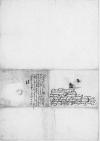Ich hab negst von(n) Ew(e)r F(urstlichen) G(naden) / etliche ⌊⌋, / do neben(n) ouch Ew(e)r F(urstlichen) G(naden) rath, h(ern) ⌊Jorg(en) Clingenbek⌋ muntliche gewerbe an mich, entphangen(n), / daraus ich sundere gnade und gunst, / die zu mir Ew(e)r F(urstliche) G(naden) tregt, vorstanden(n) / und mich des hochlichen(n) gefreut / mit erbitt(e)n, wo ich der selbig(en) Ew(e)r F(urstlichen) G(naden) vil diesnst(!) und wolgefallen(n) werde thun mugen, / mich alweg(en) ungespartes fleis finden(n) lassen(n). / Und so mir Got der almechtige in meyn(n) ⌊bisthum⌋, / darzu mir Ew(e)r F(urstliche) G(naden) / vil gluks gewunscht, / wirt helff(en), / wil mich der massen(n) gen(n) Ew(e)r G(naden) halten(n), / das Ew(e)r F(urstlichen) G(naden) von(n) meiner nachpaurschafft keyn(n) vordriss sol haben(n). / Was wir superinscribed⌈wirwir superinscribed⌉ hie thun(n), / wirt Ew(e)r F(urstlichen) G(naden) / durch gedocht(en) ⌊Klingenbek⌋ gutt(e)n bericht mit schrifften(n) erlangen(n). / An meynem(m) gutten(n) willen(n) Ew(e)r F(urstlichen) G(naden) zu dinen(n) / und dem(m) ganczn(n) hause von(n) Brandenburg / sol mir nichts abghen(n). / Wold Got, das ich vil thun kunde und vormochte. / So meyn(n) beygeben(n) briff an ⌊ko(niglich)e m(aieste)t⌋, meyn(n) allerg(nedigs)t(en) herren(n), Ew(e)r F(urstlichen) G(naden) zu handen(n) komen(n), / bit ich, wolt denn(n) selbig(en) mit den(n) erst(en) lossen(n) antwurt(en), / do mit man(n) wissen(n) mag, / das ich hie byn(n). / Hiemit thu ich mich Ewr(e)n F(urstlichen) G(naden) mit meynen(n) willig(en) dienst befelen(n) / und bit, wold meyn(n) gnedig(er) her sein(n). /
Ew(e)r F(urstlichen) G(naden) willig(er) d(iner) ⌊Ioannes Dantiscus⌋, / erwelt(er) bischoff zu ⌊Colmse⌋, / ⌊ko(nigliche)r m(aieste)t⌋ von ⌊Pol(e)n⌋ botschafft(er) eygene hant
 GStA, PK, HBA, C 2, No 13, 2 unnumbered
GStA, PK, HBA, C 2, No 13, 2 unnumbered  GStA, PK, HBA, C 2, No 13, 1unnumbered
GStA, PK, HBA, C 2, No 13, 1unnumbered 
